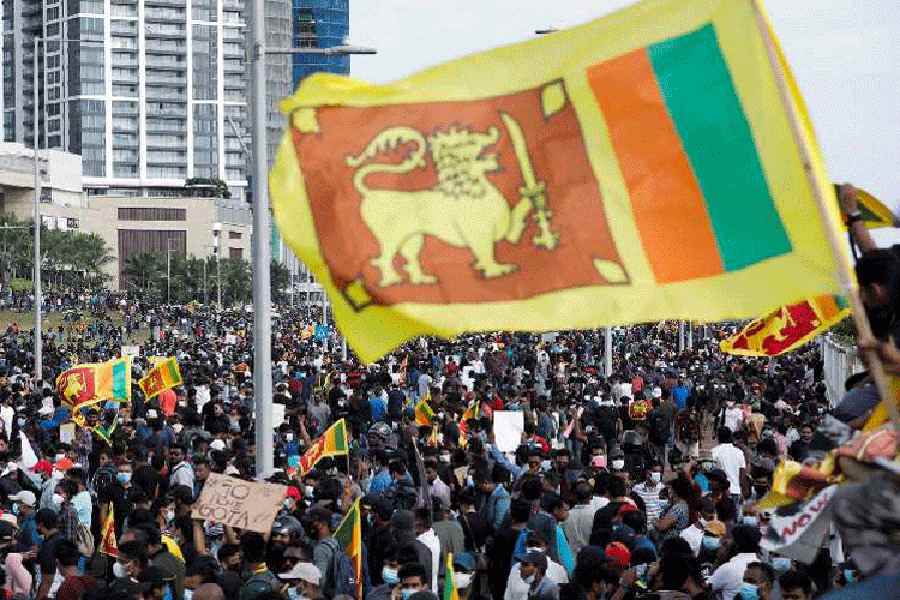Sri Lanka has failed to address the long-standing challenges of political and democratic reforms, the UN human rights body has said, an assessment rejected by Colombo as "incorrect" and based on "unsubstantiated sources".
Addressing the 54th regular session of the UN Human Rights Council in Geneva on Monday, Nada Al-Nashif, the UN Deputy High Commissioner, said, "Sri Lanka continues to deal with the aftermath of the deep economic crisis of 2022 and the current stresses in the global economy." One year after the protest movement demanding deep political and democratic reforms, the transformation that was hoped for to address the long-standing challenges has still not materialised, she told the forum while reading the latest update on Sri Lanka.
“Delays in holding local government elections and reconstituting Provincial Councils under the 13th Amendment have limited people's right to political participation and the free expression of voters,” Nada said.
The rights body noted that while the economic crisis has significantly affected the rights of large segments of the population in Sri Lanka, it has impacted the poor and marginalised communities the most.
“As the country's poverty rate has doubled from 13% in 2021 to 25% in 2022, another 2.5 million people have been driven into poverty and an estimated 37% of households face acute food insecurity,” Nada said.
Fourteen years since the civil war ended, tens of thousands of victims and their families continue to suffer in agony and grief as they wait for truth, justice, and remedy, she said.
Himalee Subhashini Arunatilaka, the Permanent Representative of Sri Lanka to the United Nations Office in Geneva, rejected the accusations.
“Sri Lanka rejects all conclusions and recommendations, including references to targeted sanctions, as they are based on incorrect and unsubstantiated sources, contravening the principles of natural justice and the principles of universality, impartiality, objectivity and non-selectivity,” she said.
"It is regrettable that the OHCHR has also chosen to ignore the democratic resilience of the country and its institutions demonstrated in the past year," Arunatilaka noted.
In her statement, the deputy UN rights chief, Nada, also said that accountability is central to securing Sri Lanka’s present and future.
"While it remains the obligation of the Sri Lankan authorities to acknowledge past violations and undertake credible accountability measures, this Council and member states can play an important and complementary role in advancing accountability,” she said.
The rights body recognises the initiatives the government has initiated to advance reconciliation, including its proposal for a new truth-seeking mechanism. However, it said the country should do more on governance, transparency, and accountability.
Nada said, “The accountability project established by our office to collect, consolidate, analyse, and preserve relevant information and evidence and provide support to relevant judicial and other proceedings, including those in member states, with competent jurisdiction. The project is receiving a steady increase in requests from competent state authorities, including in relation to 10 named (Sri Lankan) individuals to date.” Sri Lanka has been consistently rejecting all the allegations of its past human rights violations in the final stage of a 26-year war that ended in 2009.
The UN rights body since 2013 has adopted several resolutions calling for rights accountability for war crimes blamed both on the Sri Lankan government troops and the LTTE group that ran a violent campaign to create a separate state for the Tamil minority in the north and east regions.
Gotabaya Rajapaksa, the ousted former president, at that time ruthlessly ended Sri Lanka's nearly 30-year civil war with the Liberation Tigers of Tamil Eelam (LTTE) with the killing of its supremo Velupillai Prabhakaran Velupillai Prabhakaran in 2009.
Gotabaya Rajapaksa, the former defence secretary, who stands accused of violating human rights, vehemently denies the charge.
Then-president Mahinda Rajapaksa, the elder brother of Gotabaya, on May 18, 2009, declared the end of the 26-year war in which over 1,00,000 people were killed and millions of Sri Lankans, mainly minority Tamils, displaced as refugees inside the country and abroad.
Except for the headline, this story has not been edited by The Telegraph Online staff and has been published from a syndicated feed.










